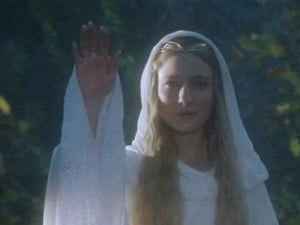 In “The Lord of the Rings: The Fellowship of the Ring” (see, I don’t just read history books!), Galadriel says “And some things that should not have been forgotten were lost. History became legend. Legend became myth.”
In “The Lord of the Rings: The Fellowship of the Ring” (see, I don’t just read history books!), Galadriel says “And some things that should not have been forgotten were lost. History became legend. Legend became myth.”
When I heard that quote it really struck me and I couldn’t stop thinking about it. Those of you who listened to last night’s webinar on George and Jane Boleyn will have heard me talking about the “lost Boleyns” and the fact that they have been surrounded by myth, legend and downright lies, for so long that it’s hard to sort the truth from the myth, fact from legend. Even historians end up quoting from sources that are actually suspect and turn out to be fictional and we find whole theories based on myth rather than evidence.
The research that I have done over the past few months into the Boleyn family has shown me that you cannot take anything for granted, you just cannot believe what you read. Everything has to be double-checked and you need to go back to the original source to read it for yourself, rather than relying on someone else’s interpretation of it. A couple of examples I cited in last night’s webinar were:-
- The idea that George Boleyn was homosexual – The evidence used to back up this idea is George’s scaffold speech, where he emphasises his sinfulness, and George Cavendish’s Metrical Visions which uses “besti*l” and “unlawful lechery” when describing George and his behaviour. However, Cavendish uses the word “besti*l” to also describe Thomas Culpeper and the phrase “unlawful lechery” about Henry VIII! As far as his execution speech, I think that it’s reading far too much into a dying man’s words to say that his descriptions of his sinful life and nature mean that he was homosexual.
Retha Warnicke wrote about the group surrounding Anne being a group of “libertines”, Philippa Gregory used Warnicke’s work when writing “The Other Boleyn Girl” and Alison Weir also references Warnicke, can you see how this idea has gone out of control without having any real basis? - Jane Boleyn as the woman who gave evidence against George and Anne – Again, sources have been misinterpreted. Alison Weir states that Chapuys, a Portuguese source, Lancelot de Carles and Jane’s execution confession are all evidence of Jane’s betrayal of her husband and sister-in-law, but historian John Guy calls her out on that, stating that Chapuys and the Portuguese source never named the mystery woman, Lancelot de Carles was writing of Lady Worcester and Jane’s execution confession is a work of fiction by Gregorio Leti. Yet, still we see these sources being stated as evidence of Jane’s guilt.
Those are just two examples of theories based on rather shaky ground.
I’m lucky in that I have always been taught to question and challenge, and, yes, I can be rather annoying, like a dog with a bone! When I read a history book I am always turning to the Notes and Sources section to check the reference and then I go and check that source for myself and funnily enough it doesn’t always correlate to the author of the book’s theory. OK, it’s what I do as a full-time job but these past few months have made it even clearer to me that anyone who is serious about getting to the truth has to do this. In an age when primary sources can be found online it is actually relatively easy to do and so rewarding.
The more I browse online in the world of Tudor history, the more emails I receive, the more I see that it’s all like a game of “Chinese whispers” or “telephone”, a case of the real story being lost and getting twisted beyond recognition. It’s like High School, when vicious rumours, with no basis, get out of hand. We have to question, check, double check and then take into account bias.
What do you think? Have you ever read something and then checked the source and found it’s saying something different? I feel so strongly about this that I’m going to write a guide for students and history lovers on how to research a topic or historical person. Do you think that’s a good idea?
P.S. Thank you to all those who joined me on the webinar last night and for all the thank you emails I’ve received, I’m so glad you all enjoyed it and it really was a pleasure and honour to be able to speak on my favourite family, the Boleyns, to people who care about them just as much as I do.